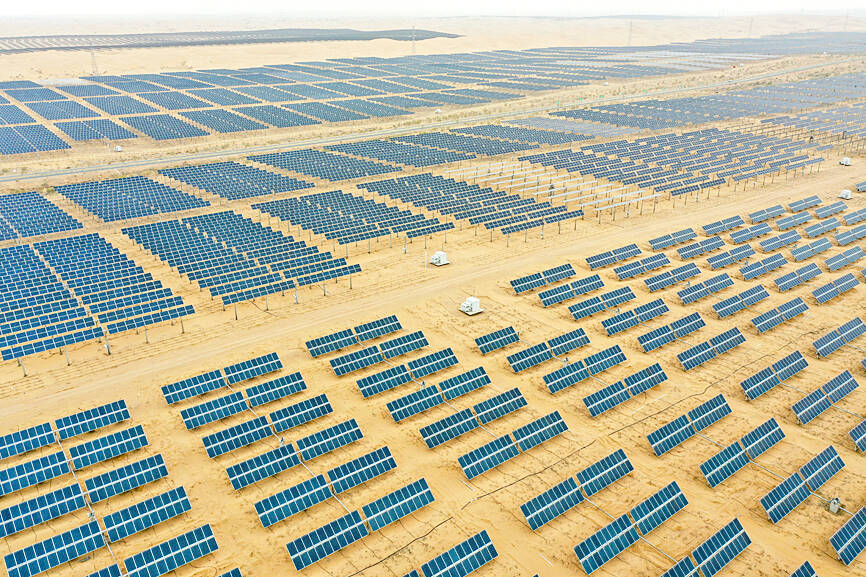China is on track to almost double its wind and solar capacity by 2025 and blow past its clean power target five years early, Global Energy Monitor has said.
The country has announced or begun construction on enough projects for total wind and solar capacity to likely reach 1,371 gigawatts (GW) by 2025, the climate research firm said in a new report.
That would vastly outstrip a goal set by Chinese President Xi Jinping (習近平) in late 2020 of having 1,200GW of panels and turbines by 2030.

Photo: EPA-EFE
China has installed record amounts of solar each of the past two years and is turbo-charging its efforts this year as an easing of supply chain bottlenecks drives down the price of panels.
Still, the country is mining record amounts of coal and building a new fleet of generators powered by the fossil fuel — and striking new long-term deals to buy natural gas — to avoid shortages that have plagued its electricity system in recent years.
“China is making strides, but with coal still holding sway as the dominant power source, the country needs bolder advancements in energy storage and green technologies for a secure energy future,” Global Energy Monitor researcher Martin Weil said.
Clean power installations this year could hit 154GW of solar, 55.7GW of onshore wind power and 8.3GW of offshore wind, according to BloombergNEF forecasts.
That is in line with an assessment published on Wednesday by the China Renewable Energy Engineering Institute, an advisory body with close links to the Chinese National Energy Administration (NEA), which has predicted solar installations of about 100GW and 60GW of wind for this year.
China already installed 61.2GW of solar power between January and last month, according to the NEA, outpacing a previous assessment from the China Photovoltaic Industry Association.
Wind installations are also rebounding after pandemic-related delays, while fierce domestic competition among manufacturers is keeping costs in check.

Seven people sustained mostly minor injuries in an airplane fire in South Korea, authorities said yesterday, with local media suggesting the blaze might have been caused by a portable battery stored in the overhead bin. The Air Busan plane, an Airbus A321, was set to fly to Hong Kong from Gimhae International Airport in southeastern Busan, but caught fire in the rear section on Tuesday night, the South Korean Ministry of Land, Infrastructure and Transport said. A total of 169 passengers and seven flight attendants and staff were evacuated down inflatable slides, it said. Authorities initially reported three injuries, but revised the number

‘BALD-FACED LIE’: The woman is accused of administering non-prescribed drugs to the one-year-old and filmed the toddler’s distress to solicit donations online A social media influencer accused of filming the torture of her baby to gain money allegedly manufactured symptoms causing the toddler to have brain surgery, a magistrate has heard. The 34-year-old Queensland woman is charged with torturing an infant and posting videos of the little girl online to build a social media following and solicit donations. A decision on her bail application in a Brisbane court was yesterday postponed after the magistrate opted to take more time before making a decision in an effort “not to be overwhelmed” by the nature of allegations “so offensive to right-thinking people.” The Sunshine Coast woman —

BORDER SERVICES: With the US-funded International Rescue Committee telling clinics to shut by tomorrow, Burmese refugees face sudden discharge from Thai hospitals Healthcare centers serving tens of thousands of refugees on the Thai-Myanmar border have been ordered shut after US President Donald Trump froze most foreign aid last week, forcing Thai officials to transport the sickest patients to other facilities. The International Rescue Committee (IRC), which funds the clinics with US support, told the facilities to shut by tomorrow, a local official and two camp committee members said. The IRC did not respond to a request for comment. Trump last week paused development assistance from the US Agency for International Development for 90 days to assess compatibility with his “America First” policy. The freeze has thrown
TESTING BAN: Satellite photos show a facility in the Chinese city of Mianyang that could aid nuclear weapons design and power generation, a US researcher said China appears to be building a large laser-ignited fusion research center in the southwestern city of Mianyang, experts at two analytical organizations said, a development that could aid nuclear weapons design and work exploring power generation. Satellite photos show four outlying “arms” that would house laser bays, and a central experiment bay that would hold a target chamber containing hydrogen isotopes the powerful lasers would fuse together, producing energy, said Decker Eveleth, a researcher at US-based independent research organization CNA Corp. It is a similar layout to the US$3.5 billion US National Ignition Facility (NIF) in northern California, which in 2022 generated